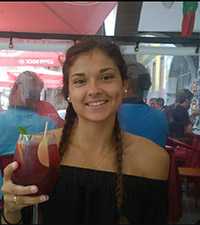
BA/MA in Archaeology 2020
Areas of Interest
Archaeology of the Iberian Peninsula, Archaeology of the Roman provinces, Classical Archaeology, GIS, Socio-Cultural disbursement and behavior
Research Interests & Fieldwork
I am interested in all things Roman. Their provinces especially to the west and their uniformity while still maintaining an identifiable cultural identity. My masters thesis involves the rural archaeology of the Alentejo region of Portugal, using GIS as a format to help identify patterns and traditional marks of behavior such as the layout of a typically Roman villa, iconography, etc. I wish to expand in general the archaeological data and theory of the Iberian using such methods.
Questions & Answers by Amanda Grace Santos
- What inspired you to pursue a career in archaeology?
I have always been passionate about history. Growing up I was surrounded by it in my hometown of Windsor, CT. Archaeology is the perfect mix of history and active research that keeps the mind and body engaged in the process of lifelong learning.
- Is there a piece of advice or conversation you’ve had with a professor that has stuck with you throughout your career?
A piece of advice I got from a professor that I valued and am thankful for is when Professor West told me to go into the workforce after my masters, rather than jumping into a PhD program. These past 6 years in the workforce have allowed me to explore other avenues of archaeology that have, in turn, enriched my skills and experience that will be valuable when I do come back to academia.
- What has been the most challenging aspect of pursuing archaeology, either academically or professionally, and how have you navigated it?
The most challenging aspect of working as an archaeologist is all the traveling. In the private sector specifically, there is a huge amount of travel that is required which often grates against other wants and needs. It is hard to establish a community when you are in a motel every week.
- Looking back, how has your perspective on archaeology evolved from when you first started studying it to where you are now?
My perspective on archaeology has changed dramatically since I began my studies in 2015, both in how I approach the job, as well as my goals. When I was in graduate school, I was being pushed to specialize, but I wasn’t keen on how split the field had become and the lack of humanity in the way we discussed our specific research. After all, isn’t the study of archaeology supposed to be about humans first and foremost? But as I began working, I realized that my reticence towards specializing had made me a sponge for everything I could absorb during my professional work – this was an asset. While I would call myself first and foremost a landscape archaeologist that’s been classically trained and keen on tying written accounts to their physical manifestations, that is merely the most encompassing title I could come up with, in reality I am an archaeologist that seeks as many opportunities as possible in as many niches of the field as possible, including incorporating ecology, hydrology, and other -ologies into how I interpret my field work. I believe that the best archaeology comes from this multidisciplinary approach and so what was once a weakness, an inability to focus my interests, has become a strength that has allowed me to work all over the country and world.
- Is there anything else unique to you that you’re willing to share (especially fieldwork experiences)?
Working in the private and federal sectors has been the perfect balance for me to learn all the other types of work I can do in archaeology. Finding my own career path, however hard, has allowed me to tie my passion for justice work with Indigenous communities to inform my career, and the connections I have made with Native Nations across the country have enriched my approach to not only archaeology but also my life.




